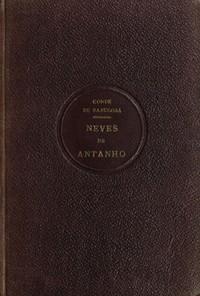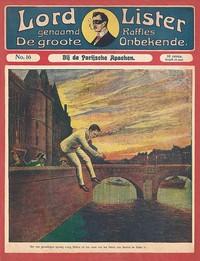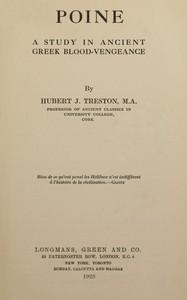|
|
Read this ebook for free! No credit card needed, absolutely nothing to pay.Words: 79670 in 28 pages
This is an ebook sharing website. You can read the uploaded ebooks for free here. No credit cards needed, nothing to pay. If you want to own a digital copy of the ebook, or want to read offline with your favorite ebook-reader, then you can choose to buy and download the ebook.

: Neves de antanho by Sabugosa Ant Nio Maria Jos De Melo C Sar E Meneses Conde De - Portugal History; Women Portugal@FreeBooksThu 08 Jun, 2023 Author's Note My first visit to the United States of America--a short one--was paid in 1888. The observations on which this book is mainly based were, however, made in 1890-93, when I spent nearly three years in the country, engaged in the preparation of "Baedeker's Handbook to the United States." My work led me into almost every State and Territory in the Union, and brought me into direct contact with representatives of practically every class. The book was almost wholly written in what leisure I could find for it in 1895 and 1896. The foot-notes, added on my third visit to the country , while I was seeing the chapters through the press, have at least this significance, that they show how rapidly things change in the Land of Contrasts. So far as the book has any general intention, my aim has been, while not ignoring the defects of American civilisation, to dwell rather on those features in which, as it seems to me, John Bull may learn from Brother Jonathan. I certainly have not had so much trouble in finding these features as seems to have been the case with many other British critics of America. My sojourn in the United States has been full of benefit and stimulus to myself; and I should like to believe that my American readers will see that this book is substantially a tribute of admiration and gratitude. J.F.M. Introductory It is not everyone's business, nor would it be everyone's pleasure, to visit the United States of America. More, perhaps, than in any other country that I know of will what the traveller finds there depend on what he brings with him. Preconception will easily fatten into a perfect mammoth of realisation; but the open mind will add immeasurably to its garner of interests and experiences. It may be "but a colourless crowd of barren life to the dilettante--a poisonous field of clover to the cynic" ; but he to whom man is more than art will easily find his account in a visit to the American Republic. The man whose bent of mind is distinctly conservative, to whom innovation always suggests a presumption of deterioration, will probably be much more irritated than interested by a peregrination of the Union. The Englishman who is wedded to his own ideas, and whose conception of comfort and pleasure is bounded by the way they do things at home, may be goaded almost to madness by the gnat-stings of American readjustments--and all the more because he cannot adopt the explanation that they are the natural outcome of an alien blood and a foreign tongue. If he expects the same servility from his "inferiors" that he has been accustomed to at home, his relations with them will be a series of electric shocks; nay, his very expectation of it will exasperate the American and make him show his very worst side. The stately English dame must let her amusement outweigh her resentment if she is addressed as "grandma" by some genial railway conductor of the West; she may feel assured that no impertinence is intended. The lover of scenery who expects to see a Jungfrau float into his ken before he has lost sight of a Mte. Rosa; the architect who expects to find the railway time-table punctuated at hourly intervals by a venerable monument of his art; the connoisseur who hopes to visit a Pitti Palace or a Dresden Picture Gallery in every large city; the student who counts on finding almost every foot of ground soaked with historic gore and every building hallowed by immemorial association; the sociologist who looks for different customs, costumes, and language at every stage of his journey;--each and all of these will do well to refrain his foot from the soil of the United States. On the other hand, the man who is interested in the workings of civilisation under totally new conditions; who can make allowances, and quickly and easily readjust his mental attitude; who has learned to let the new comforts of a new country make up, temporarily at least, for the loss of the old; who finds nothing alien to him that is human, and has a genuine love for mankind; who can appreciate the growth of general comfort at the expense of caste; who delights in promising experiments in politics, sociology, and education; who is not thrown off his balance by the shifting of the centre of gravity of honour and distinction; who, in a word, is not congealed by conventionality, but is ready to accept novelties on their merits,--he, unless I am very grievously mistaken, will find compensations in the United States that will go far to make up for Swiss Alp and Italian lake, for Gothic cathedral and Palladian palace, for historic charters and time-honoured tombs, for paintings by Raphael and statues by Phidias. The paragraph on a previous page is not meant to imply that the United States are destitute of scenic, artistic, picturesque, and historic interest. The worst that can be said of American scenery is that its best points are separated by long intervals; the best can hardly be put too strongly. Places like the Yosemite Valley , the Yellowstone Park, Niagara, and the stupendous Ca?on of the Colorado River amply make good their worldwide reputation; but there are innumerable other places less known in Europe, such as the primeval woods and countless lakes of the Adirondacks, the softer beauties of the Berkshire Hills, the Hudson , the Swiss-like White Mountains, the Catskills, the mystic Ocklawaha of Florida, and the Black Mountains of Carolina that would amply repay the easy trouble of an Atlantic passage under modern conditions. The historic student, too, will find much that is worthy of his attention, especially in the older Eastern States; and will, perhaps, be surprised to realise how relative a term antiquity is. In a short time he will find himself looking at an American building of the seventeenth century with as much reverence as if it had been a contemporary of the Plantagenets; and, indeed, if antiquity is to be determined by change and development rather than by mere flight of time, the two centuries of New York will hold their own with a cycle of Cathay. It is, as Dr. Oliver Wendell Holmes remarked to the present writer, like the different thermometrical scales; it does not take very long to realise that twenty-five degrees of R?aumur mean as great a heat as ninety degrees of Fahrenheit. Such a city as Boston amply justifies its inclusion in a "Historic Towns" series, along with London and Oxford; and it is by no means a singular instance. Even the lover of art will not find America an absolute Sahara. To say nothing of the many masterpieces of European painters that have found a resting-place in America, where there is at least one public picture gallery and several private ones of the first class, the best efforts of American painters, and perhaps still more those of American sculptors, are full of suggestion and charm; while I cannot believe that the student of modern architecture will anywhere find a more interesting field than among the enterprising and original works of the American school of architecture. This book will be grievously misunderstood if it is supposed to be in any way an attempt to cover, even sketchily, the whole ground of American civilisation, or to give anything like a coherent appreciation of it. In the main it is merely a record of personal impressions, a series of notes upon matters which happened to come under my personal observation and to excite my personal interest. Not only the conditions under which I visited the country, but also my own disqualifications of taste and knowledge, have prevented me from more than touching on countless topics, such as the phenomena of politics, religion, commerce, and industry, which would naturally find a place in any complete account of America. I have also tried to avoid, so far as possible, describing well-known scenery, or in other ways going over the tracks of my predecessors. The phenomena of the United States are so momentous in themselves that the observation of them from any new standpoint cannot be wholly destitute of value; while they change so rapidly that he would be unobservant indeed who could not find something new to chronicle. Finally, I ought perhaps to say, with Mr. E.A. Freeman, that I sometimes find it almost impossible to believe that the whole nation can be so good as the people who have been so good to me. FOOTNOTES: I have some suspicion that this ought to be in quotation marks, but cannot now trace the passage. Free books android app tbrJar TBR JAR Read Free books online gutenberg More posts by @FreeBooks
: Matkani ulkomaille by Hauvonen Nikodemus - Voyages and travels; Hauvonen Nikodemus 1845-1897 Travel@FreeBooksThu 08 Jun, 2023

: Lord Lister No. 0016: Bij de Parijsche Apachen by Blankensee Theo Von Hageman Felix Leonard Felix Matull Kurt - Detective and mystery stories Periodicals; Dime novels Periodicals@FreeBooksThu 08 Jun, 2023
|
Terms of Use Stock Market News! © gutenberg.org.in2025 All Rights reserved.






